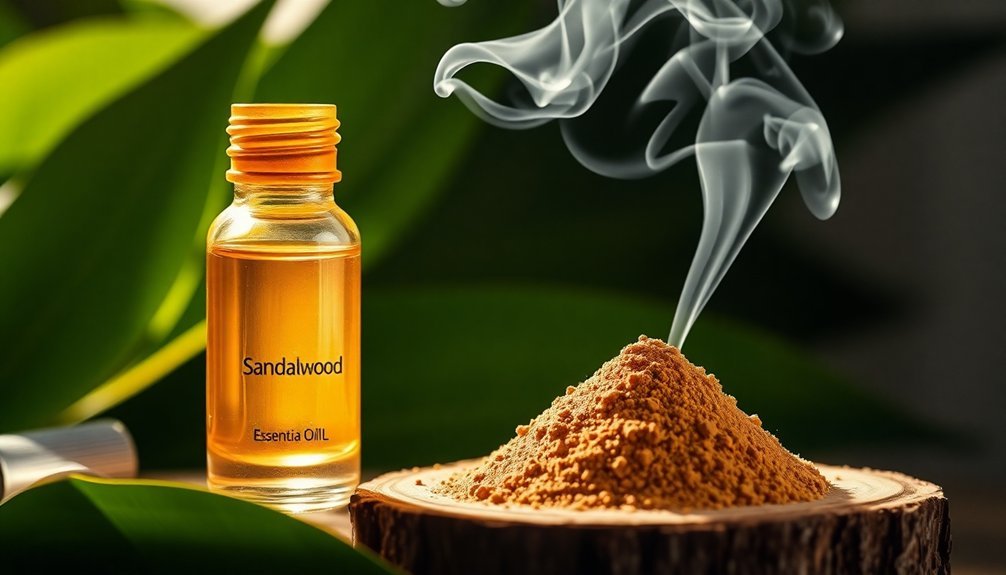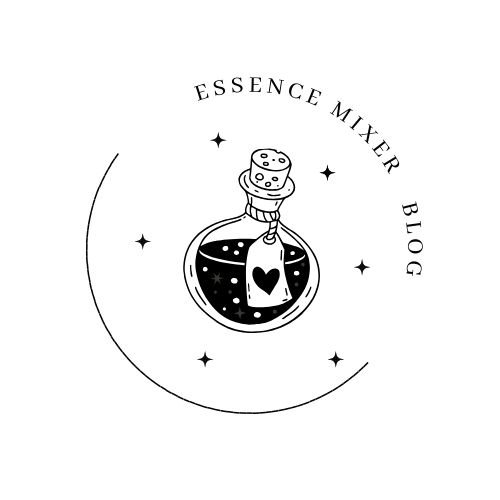For long-lasting homemade perfumes, you'll want to incorporate these five powerful fixatives: sandalwood essential oil for its sweet woody stability, patchouli oil's deep earthiness that improves with age, benzoin resin's vanilla-like staying power, vetiver's intense smoke-leather anchoring abilities, and frankincense's sacred lifting properties. Each fixative brings unique characteristics to extend your blend's life while adding depth to the composition. Discover how these natural stabilizers can transform your fragrance creations into lasting masterpieces.
Why Sandalwood Essential Oil Stands Above the Rest

When it comes to creating long-lasting perfume blends at home, sandalwood essential oil emerges as the gold standard among fixatives. You'll find its sweet, woody aroma doesn't just add depth to your blends – it actively stabilizes other fragrance components and reduces their volatility, ensuring your perfumes last longer.
What sets sandalwood apart is its versatility. You can pair it with everything from rose and frankincense to citrus notes, while its natural santalol content provides that distinctive fragrance you won't find elsewhere.
Its impressive 4,000-year history in perfumery isn't just for show – ancient civilizations recognized its unique ability to equalize vapor pressures and enhance fragrance stability. Modern perfume makers prize sandalwood for its antiseptic and preservative qualities in beauty formulations.
Whether you're crafting a floriental blend or a romantic scent, sandalwood's antimicrobial properties and fixative power make it an unbeatable choice.
Patchouli Oil: The Ancient Art of Scent Anchoring
Among nature's most potent fixatives, patchouli oil stands as a proof of ancient perfumery wisdom.
You'll discover its complex aroma unfolds in layers, starting with a camphoraceous top note that evolves into rich, earthy depths with sweet, musky undertones.
When you're creating home perfume blends, you'll find patchouli's fixative properties invaluable. It not only anchors other fragrances but also improves with age, developing a smoother, more refined character. Originally native to Southeast Asia, patchouli has been prized in perfumery for centuries.
You can blend it confidently with rose, vanilla, sandalwood, or citrus notes for lasting compositions.
Beyond its fixative role, you're getting additional benefits: it purifies the air, promotes restful sleep, and brings a grounding energy to your space.
Its versatility makes it equally effective in both masculine and feminine formulations.
Benzoin Resin: Sweet Stability for Your Blends

A treasure from Southeast Asian forests, benzoin resin offers perfume enthusiasts a naturally sweet fixative for their home blends.
When you're crafting fragrances, you'll find this golden-hued resin, harvested from Styrax trees, indispensable for extending your scent's longevity.
You'll love benzoin's vanilla-like aroma that not only anchors other scents but adds its own balsamic warmth to your creations. The resin has become especially valued in Orthodox Christian incense worldwide.
For best results, dissolve it in DPG or hot water, or use it pre-diluted with alcohol. You can also blend it directly into oils with gentle heat.
Beyond its fixative properties, you're getting additional benefits: it prevents oxidation, fights bacteria, and adds stability to your blends.
Whether you're making perfumes, soaps, or aromatherapy products, benzoin's sweet stability makes it a must-have in your DIY arsenal.
Vetiver's Deep-Rooted Fixing Power
Derived from ancient Indian traditions, vetiver root stands as one of perfumery's most powerful natural fixatives. You'll find this remarkable ingredient can extend your fragrance's longevity by lowering the vapor pressure of other scent components, preventing them from evaporating too quickly.
When you're creating home perfume blends, vetiver's complex profile of over 100 compounds makes it an excellent bottom note. You'll notice its deep, earthy aroma with smoky and leathery undertones adds sophistication while anchoring other scents.
It's incredibly versatile, blending beautifully with woody, oriental, chypre, and floral compositions.
For the best results, remember that vetiver oil improves with age. While it's an investment – requiring one ton of roots to produce just ten kilos of oil – its powerful fixing properties make it worth considering for your perfume projects.
Frankincense: Sacred Stabilizer for Modern Blends

While vetiver anchors fragrances from below, frankincense lifts and stabilizes them from within. You'll find this sacred resin's warm, potent character transforming your home perfume blends with just a 3-5% addition to your formula.
| Property | Benefit |
|---|---|
| Vapor Pressure | Equalizes evaporation rates |
| Stabilizing Effect | Prolongs volatile components |
| Base Note | Anchors entire composition |
| Natural Origin | Provides authentic resinous depth |
| Blending Versatility | Enhances both florals and woods |
When you're crafting your blend, start with small amounts of frankincense to harness its fixing power. Unlike synthetic fixatives, it contributes its own distinctive aroma while extending your fragrance's life. Test your creation on scent strips to observe how it stabilizes other notes, particularly in oriental and woody compositions. You'll discover why this time-tested fixative remains essential in modern perfumery.
Frequently Asked Questions
Can I Mix Different Types of Fixatives in the Same Perfume Blend?
Yes, you can mix different fixatives in your perfume blend. It's actually beneficial as it creates a more complex scent profile and enhances longevity, but you'll need to add them carefully to avoid over-fixation.
What Percentage of Fixatives Should I Use in Oil-Based Versus Alcohol-Based Perfumes?
You'll want to use 3-5% fixatives in both oil and alcohol-based perfumes. For alcohol-based blends, you can mix 10ml fixative with 30ml fragrance oil, adjusting as needed for your desired scent profile.
How Do Temperature and Humidity Affect the Performance of Natural Fixatives?
You'll notice natural fixatives perform best at moderate temperatures (20-25°C) and lower humidity. High heat can weaken their binding properties, while excess moisture reduces their effectiveness at slowing down fragrance evaporation.
Which Fixatives Work Best for Citrus-Based Perfume Formulations?
You'll get excellent results using ambergris or Ambroxan as primary fixatives for citrus scents. Combine these with benzoin resinoid and small amounts of Iso E Super for ideal longevity and stability.
Do Synthetic Fixatives Cause Skin Reactions More Often Than Natural Ones?
No, you can't definitively say synthetic fixatives cause more reactions than natural ones. While synthetics can irritate sensitive skin, natural fixatives like essential oils can be equally or more likely to trigger allergic responses.
In Summary
You're now equipped with nature's best fixatives to create lasting home fragrances that won't fade quickly. Whether you choose sandalwood's creamy richness, patchouli's earthy grip, benzoin's vanilla-like warmth, vetiver's grounding power, or frankincense's resinous strength, you'll find these natural anchors indispensable. Start experimenting with these five fixatives, and you'll notice how they transform your blends from fleeting wisps into enduring signatures.





Leave a Reply